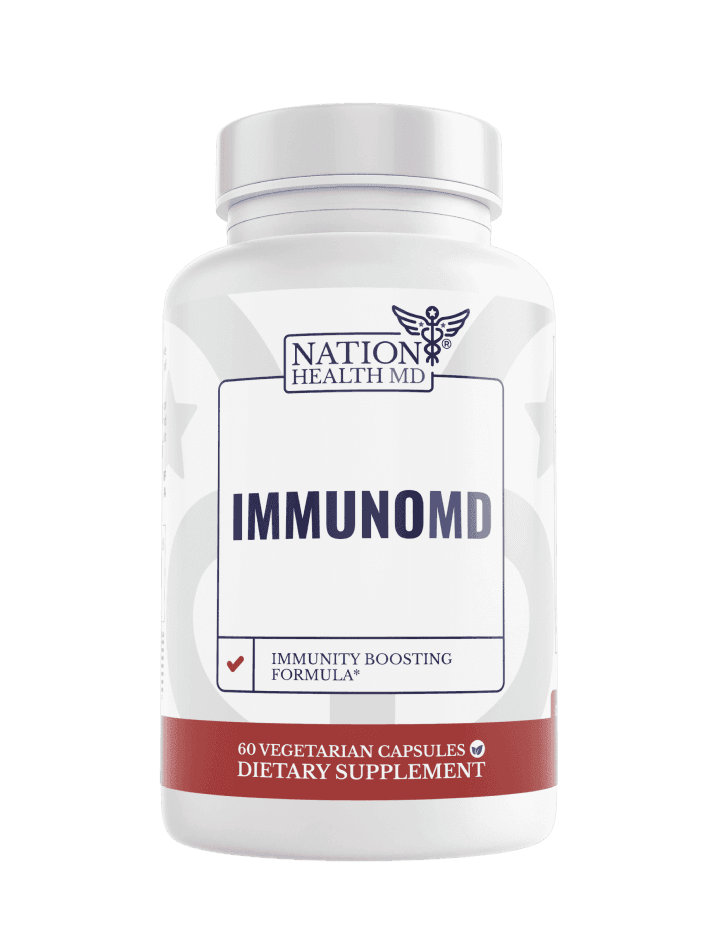Is Your Immune System Weaker When You’re Pregnant?
Medically reviewed by our experts


Pregnancy brings countless changes to your body, and many expectant mothers wonder: is your immune system weaker when pregnant? This common question deserves thoughtful consideration. Pregnancy creates a unique physiological state where your body must carefully balance protecting both you and your developing baby. In this blog, we’ll explore the nuanced changes in immune function during pregnancy and provide evidence-based information on supporting wellness during this important time.
Key Article Findings
- Pregnancy causes strategic immune adaptations – not simply weakening – to protect both mother and baby
- Nutrition, rest, exercise and stress management strongly influence maternal immune health
- Individual immune experiences vary during pregnancy, highlighting the importance of personalized care
Understanding Immune Function During Pregnancy
Pregnancy creates a remarkable transformation in your body, including significant adjustments to your immune system of pregnant woman. Rather than simply becoming “weaker,” your immune system undergoes a sophisticated rebalancing act.
Your immune system faces a unique challenge during pregnancy: it must continue protecting you from harmful pathogens while simultaneously accepting the developing baby, who carries genetic material different from your own. This biological paradox requires precise regulation.
Pregnancy and immunity involve complex adaptations that change throughout each trimester:
- First trimester – Your body establishes tolerance to the embryo while maintaining strong defenses against infections
- Second trimester – The immune system reaches a more balanced state with moderate anti-inflammatory responses
- Third trimester – Immunity shifts toward a more pro-inflammatory state in preparation for labor
Certain aspects of your immune system may actually become enhanced during pregnancy. For example, your innate immunity (the first-line defense against pathogens) often works more efficiently. Meanwhile, specific adaptive immune responses become carefully modulated to protect the developing baby.
These changes serve critical biological purposes: they create a safe environment for fetal development while maintaining maternal health. The immune system works differently – not necessarily worse – during pregnancy, making strategic compromises to support new life while still protecting you from potential threats.
The Science Behind Maternal Immune Adaptation
The complex relationship between pregnancy and immunity involves fascinating biological mechanisms. While some believe pregnancy lowers immune system function overall, research reveals a more nuanced picture.
Hormonal changes drive many immune adaptations during pregnancy. Progesterone, estrogen, and human chorionic gonadotropin (HCG) all influence how immune cells behave:
- Natural killer cells decrease in activity to prevent rejection of the growing fetus
- Regulatory T-cells increase to maintain tolerance
- Neutrophils become more active, enhancing first-line defenses
The placenta serves as a remarkable immune regulatory organ, releasing factors that modify maternal immunity while creating a protective barrier for the baby. It produces proteins that dampen potentially harmful inflammatory responses while still allowing beneficial immune activities.
Studies suggest these changes follow a careful pattern throughout pregnancy. During early gestation, inflammatory responses decrease to allow implantation. Later, certain immune functions actually strengthen to protect both mother and child.
Recent research has revealed how precisely balanced these immune shifts are – not simply suppressed as once thought, but strategically modified to support successful pregnancy while maintaining protection against environmental threats.
Common Misconceptions About Pregnancy and Immunity
Many myths circulate about immunity in pregnancy, often causing unnecessary worry for expectant mothers. Let’s set the record straight on some common misconceptions.
One prevalent myth suggests pregnant women are defenseless against all illnesses. In reality, the immune system during pregnancy adapts rather than shuts down. While you may be more susceptible to certain infections like influenza, your body maintains robust defenses against many other threats.
Another misunderstanding involves confusing immune adaptation with complete suppression. Your body makes strategic adjustments – not a wholesale weakening – to accommodate your baby while protecting you.
Many pregnant women notice changes in how their bodies respond to minor illnesses. These differences reflect your immune system’s shifted priorities, not necessarily increased vulnerability:
- More frequent nasal congestion due to increased blood flow
- Changes in fever response
- Different recovery patterns from common colds
Individual experiences vary significantly. Some women notice minimal changes in their susceptibility to illness, while others feel more vulnerable during certain trimesters.
Nutrition and Immune Function During Pregnancy
Proper nutrition plays a vital role in maintaining a healthy immune system pregnancy. During this special time, your nutritional needs increase to support both your changing body and your developing baby. Pregnant women are typically more aware of their nutrition choices, which often raises questions such as: “What foods best support immunity?” “Can pregnant women take milk thistle?” or “Which supplements are safe during pregnancy?”
Several key nutrients directly support immune function during pregnancy:
- Vitamin C helps produce white blood cells and enhances their effectiveness
- Vitamin D regulates immune responses and supports respiratory health
- Zinc contributes to cell development and immune cell function
- Iron helps transport oxygen and supports overall energy levels
For those looking to complement their nutritional intake, supplements like Immuno MD may offer additional support alongside a healthy diet. This supplement contains immune-supporting ingredients like Propolis and Vitamin C, which could be beneficial during pregnancy.
While a balanced diet should remain your primary source of nutrients, high-quality supplements can help fill potential nutritional gaps that modern lifestyles sometimes create. However, it is always important to discuss any supplement with your healthcare provider before adding it to your pregnancy wellness routine.
Lifestyle Factors that Support Maternal Wellness
Supporting your immune system during pregnancy extends beyond nutrition to encompass your overall lifestyle. Simple daily habits can have profound effects on your wellbeing during this special time.
Quality sleep becomes especially crucial during pregnancy. Your body needs adequate rest to maintain immune function and support your growing baby. Most pregnant women benefit from:
- Aiming for 7-9 hours of sleep nightly
- Creating a consistent sleep schedule
- Using pregnancy pillows to improve comfort
- Limiting screen time before bed
Regular, appropriate physical activity contributes to a healthy pregnancy. Walking, swimming, and prenatal yoga help maintain fitness while supporting immune health through improved circulation and stress reduction.
Stress management deserves special attention as chronic stress can affect your immune system. Consider these pregnancy-friendly approaches:
- Gentle breathing exercises
- Prenatal meditation
- Connecting with supportive friends and family
- Engaging in enjoyable, relaxing activities
Good hygiene practices remain fundamental for preventing illness. Regular handwashing, avoiding close contact with sick individuals, and food safety practices create an important first line of defense.
Environmental considerations also matter. Limiting exposure to harsh chemicals, secondhand smoke, and pollution helps support your overall wellness during this important time.
When to Consult Healthcare Providers
While immune adaptations during pregnancy are normal, certain situations warrant professional attention. Contact your healthcare provider if you experience:
- Fever above 100.4°F (38°C)
- Persistent cough or difficulty breathing
- Unusual fatigue that doesn’t improve with rest
- Symptoms of infections that worsen or don’t resolve
Regular prenatal visits allow healthcare providers to monitor your overall health throughout pregnancy. These appointments typically include blood pressure checks, weight monitoring, and discussions about any concerns you might have.
Open communication with your healthcare team creates the foundation for a healthy pregnancy. Don’t hesitate to ask questions about immune function or illness prevention during your visits.
Conclusion
Pregnancy creates sophisticated immune adaptations – not just weakness – that protect both you and your baby. So, is your immune system weaker when pregnant? The answer involves complex biological changes serving critical purposes. Focus on nutrition, rest, and appropriate activity to support your wellbeing. Maintain regular prenatal care and communicate openly with healthcare providers about any concerns. With evidence-based approaches, you can navigate pregnancy’s immune changes with confidence.
Some women may experience more intense cold symptoms during pregnancy due to immune adaptations and physical changes like increased congestion from higher blood volume. Symptoms might last longer, but this varies between individuals.
Pregnancy’s immune adaptations may increase susceptibility to certain infections like influenza while maintaining protection against others. The risk varies by trimester and individual factors, not representing a universal increase in illness.
Commercially processed honey is generally considered safe during pregnancy. The pasteurization process eliminates potential harmful bacteria. However, raw, unpasteurized honey should be avoided to prevent rare but potential foodborne illness.
Lemons can be beneficial during pregnancy, providing vitamin C to support immune function and iron absorption. Many women find lemon water helpful for morning sickness. Enjoy lemons as part of a varied, nutrient-rich diet.
Brief warm showers are generally fine during pregnancy. However, very hot showers should be avoided as they can raise core body temperature. Aim for comfortable warmth rather than intense heat for safety.
Mor, G., & Cardenas, I. (2010). REVIEW ARTICLE: The Immune System in Pregnancy: A Unique complexity. American Journal of Reproductive Immunology, 63(6), 425–433.
Aristizábal, B., & González, Á. (2013). Innate immune system. Autoimmunity – NCBI Bookshelf.
Sharma, S., et al. (2022). Immune-metabolic adaptations in pregnancy: A potential stepping-stone to sepsis. EBioMedicine, 86, 104337.
Ding, J., et al. (2022). Mechanisms of immune regulation by the placenta: Role of type I interferon and interferon‐stimulated genes signaling during pregnancy*. Immunological Reviews, 308(1), 9–24.
Mor, G., et al. (2011). Inflammation and pregnancy: the role of the immune system at the implantation site. Annals of the New York Academy of Sciences, 1221(1), 80–87.
Kepley, J. M., et al. (2023). Physiology, maternal changes. StatPearls – NCBI Bookshelf.
Van Gorkom, G. N. Y., et al. (2018). Influence of vitamin C on lymphocytes: an overview. Antioxidants, 7(3), 41.
Hughes, D. A., & Norton, R. (2009). Vitamin D and respiratory health. Clinical & Experimental Immunology, 158(1), 20–25.
Wessels, I., Maywald, M., & Rink, L. (2017). Zinc as a gatekeeper of immune function. Nutrients, 9(12), 1286.
Lakhal-Littleton, S., & Robbins, P. A. (2017). The interplay between iron and oxygen homeostasis with a particular focus on the heart. Journal of Applied Physiology, 123(4), 967–973.
Al-Hariri, M. (2019). Immune’s-boosting agent: Immunomodulation potentials of propolis. Journal of Family and Community Medicine, 26(1), 57.
Moore, A., & Khanna, D. (2023). The role of vitamin C in human immunity and its treatment potential against COVID-19: a review article. Cureus.
Marshall, N. E., et al. (2021). The importance of nutrition in pregnancy and lactation: lifelong consequences. American Journal of Obstetrics and Gynecology, 226(5), 607–632.
Exercise during pregnancy. (n.d.). ACOG.
Clinic, C. (2025). Yes, there is such a thing as stress sickness. Cleveland Clinic.
Hygiene and respiratory viruses prevention. (2024). Respiratory Illnesses.
Popular Articles
Advertisement. This site offers health, wellness, fitness and nutritional information and is designed for educational purposes only. You should not rely on this information as a substitute for, nor does it replace, professional medical advice, diagnosis, or treatment. If you have any concerns or questions about your health, you should always consult with a physician or other health-care professional. Do not disregard, avoid or delay obtaining medical or health related advice from your health-care professional because of something you may have read on this site. The use of any information provided on this site is solely at your own risk.








